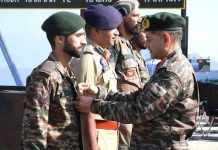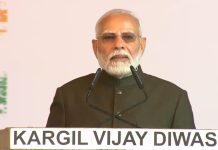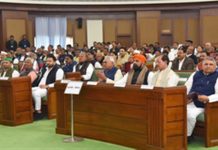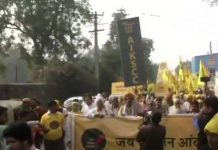After the arrest of Delhi CM Kejriwal and ex-Jharkhand CM Soren, fears are being expressed that at the rate the Opposition is getting targeted, will there be any elections — fair and free from fear ? ! by Humra Quraishi

Will there be any Opposition left before the general elections? Unease and apprehensions are spreading out amongst the masses with the arrest of Arvind Kejriwal – the Delhi chief minister who is also heading the AAP political party. Not to be overlooked is the significant fact that prominent AAP politicians have already been arrested and sit jailed.
In fact, pointers to the hounding of the Opposition leaders got writ large weeks back, after hurdles were thrown in the Rahul Gandhi-led Bharat Jodo Nyay Yatra. Though Rahul Gandhi was determined to carry on against all possible risks and threats, the big question that loomed large was this: Was the right-wing government rattled to see the masses participating in the Yatra and doing so, so very spontaneously and eagerly!… And with the arrest of Jharkhand chief minister Hemant Soren of the Jharkhand Mukti Morcha, apprehensions had spread out. Doing the rounds the obvious – at the rate the Opposition is getting targeted, will there be any elections! Fair and free from fear! Or will democracy be throttled, paving way for dictatorship.
Also, stands out the fact that senior Opposition leaders are forewarning that violence could be used by the ruling brigades to create an atmosphere of fear. Though let me hasten to add that fear laden atmosphere already well exists! Every single day, the common man is the target. Where does he or she go for help! Who’s there to hear those cries of our fellow citizens in these homeless-jobless-penniless-bulldozing times, as homes and shops and age old structures of the poorest of the poor are getting bulldozed!
Unease and apprehensions are coming to the fore as hundreds of activists and retired civil servants and lawyers are coming up with doubts about the EVMs and the connected aftermath…coming up with the relevant questions – will there be transparency and accountability?
Women ought to be heard!
Women’s Day has come and gone! Women surviving how they were! Promises of their well-being, safe and sound upkeep remain confined to the stale political speeches of the rulers of the day. Nothing concrete can be expected to take place in a situation, where reported cases of targeted assaults and attacks against them are on the rise.
I don’t attend Women’s Day functions, for no specific reason except for the basic fact that in spite of all the hyped propaganda, the condition of our women hasn’t improved in recent years. But last fortnight, I did attend one of the discussions, hosted by Om Books International’s editor-in- chief, Shantanu Ray Chaudhuri. The interactive session with three eminent writers- Aruna Chakravarti, Harshali Singh and Nandini Sen, revolved around – The Art of Storytelling!
I was drawn to the very concept – the art of storytelling. Here I’d like to focus on the fact that perhaps the only viable option that can bring about some level of relief to women is to tell and offload their stories in whichever form they can! Those who cannot write their stories should try to relay them in the vocal mode – Dastangoi. Yes, why not! It’s our traditional and age old style of relaying stories. Let language or regional barriers not come in the way. In this day and age of translations and translators there are several options to help bridge gaps and boundaries. Above all, human emotions remain unchanging whether you are here or there!
And as I moderated the session, I asked the panellists to comment of this reality that bothers me: why is it that though each one of us has hundreds of stories to offload but only a handful actually manage to do so …the rest carrying all their untold tales with them till their dying day! Why? Also, a connected factor or call it an offshoot: Much against the myth that storytelling or writing could be easy going, it isn’t. It’s tough. But stories ought to be told. Should be told a hundred times; relayed from one generation to the next. One ought to be prepared that storytelling could be emotionally draining and involves much effort and time but it’s all worth it …I would go the extent to say that let storytelling be encouraged right from the school and college level. This is essential for emotional upkeep and survival, in these turbulent times.
A tribute to Talat Mahmood
New Delhi-based media personality Sahar Zaman has brought out this well detailed and well researched volume on her grand uncle, Talat Mahmood, titled “Talat Mahmood – The Definite Biography.” It’s brimming with just about any and every aspect to the life and times of the legendary singer.
To quote Sahar from the book: “Inching closer to his centenary year in 2024, my wish was to have this exclusive work of non-fiction in the hands of music lovers across the world, to enjoy and marvel at his pioneering journey. This is my gift in lieu of all the love and pride. It’s the story of an artist whose career cuts across the history of India. From being a pre-independence celebrity to being Independent India’s film star. Coming from an educated and cultured Muslim family that supported our freedom movement, this is a musical journey in which the birth and evolution of India is closely entwined. The biography explores his indelible mark on the Golden Era of films by taking you behind the scenes of moments from the recording studio, personal friendships with colleagues and the impact of his stardom…”
She also comments, “I feel blessed to be his grand-niece where members of my family have dug into their archives of old letters, diaries and incidents to revisit his younger days and help recreate exclusive insights. My brother Samar, an aficionado of old film songs, has been the constant ‘fact-checker’ of dates, names and events in his life. This is an attempt to discover Talat as a person and rediscover his music. But it does not claim to be a music analysis of his work. That task is best left to the people who are well-versed in the rich heritage of India’s classical and folk traditions.”
It is a volume written not just with abundance of facts and details but also with a lot of intense involvement and passion and emotions.











